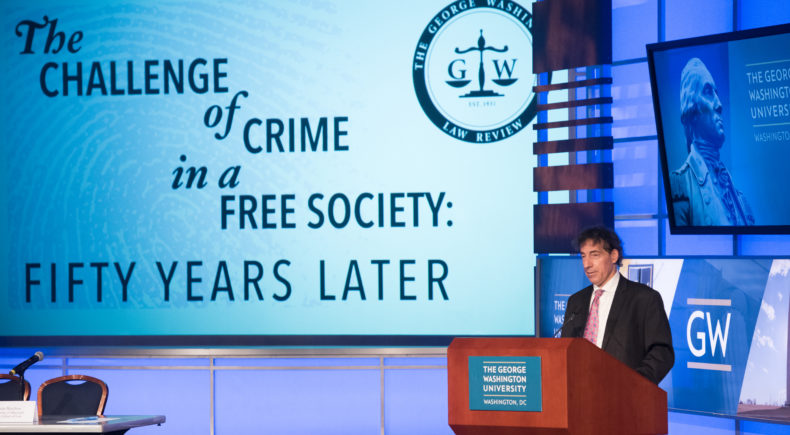Symposium 2017 | Keynote Address by Congressman Jamie Raskin
On October 27, 2019, Congressman Jamie Raskin of the U.S. House of Representatives delivered the lunchtime keynote address at The George Washington Law Review’s Symposium, The Challenge of Crime in a Free Society: 50 Years Later. Congressman Raskin, Vice-Ranking Member of the House Judiciary Committee and Co-Sponsor of the National Criminal Justice Commission Act of 2017, spoke about the need to create a national criminal justice commission today to update and continue the work of the Johnson commission fifty years ago. He examined successes in criminal justice reform and areas of bipartisan agreement for continued progress.
Congressman Raskin reflected on the progress and problems that face our society today. He discussed how certain aspects of the criminal justice system have gotten worse, including increased incarceration, growing social disintegration in many communities, and new crises, such as the opioid epidemic. He also pointed out, however, that there is opportunity to pave the way for future reforms in the areas of agreement between the political parties. A new commission would give us the opportunity to evaluate both the problems and potential solutions.
While little is currently being done in Congress, Congressman Raskin discussed some of the progress made in Maryland when he was a state senator; he noted that these were areas that could be considered by a new commission. He discussed the growing bipartisan support in Maryland for finding solutions that reduce levels of incarceration, reduce criminalization, and make the system fairer and more humane.
First, he discussed the movement to abolish the death penalty in Maryland. Maryland bore witness to the first death row prisoner to be exonerated by DNA evidence. Additionally, there is a current trend, including five to six states over the last decade, of states abolishing the death penalty. Recent evidence shows that there is no deterrent effect, and that the death penalty in fact causes the coarsening of sensibilities about life and death. The use of the death penalty correlates with high homicide rates, as seen in Texas, Florida, and Virginia. The effectiveness of the death penalty, and whether we should join most modern democracies which have discarded it or remain in the company of countries such as Syria, Iran, and China, should be on the table for a new commission.
Second, he discussed the progress in securing voting rights for those who have served time in prison. The vast majority of jurisdictions have restored those rights, as it is often not about deterrence or rehabilitation, but voter suppression. He discussed his work with Gwendolyn Bricks to pass a similar bill in Maryland. Now, there are only seven or eight states that continue to disenfranchise felons; this is also an issue that could be taken up by a new commission.
Finally, Congressman Raskin discussed the changes in the public consciousness and academic literature about crime and flaws in the criminal justice system. There is an opportunity to galvanize the public sensitivities and channel them into policy recommendations as a basis for real bipartisan action in Congress and states across the country. The use of commissions allows participants to move beyond reflexive partisan positions, build trust, and consult with experts in the field. A new commission could develop proposals that appeal to change agents across the political spectrum.
During the question and answer portion of his remarks, Congressman Raskin discussed that there is currently no strategy to get the House and Senate versions of the National Criminal Justice Commission Act of 2017 sponsored. Because of the current political climate where priorities are driven by the day’s news, it is not a high priority on Congress’s current agenda. However, this is a bipartisan issue and could bring representatives together across the aisle. In response to a question about the current ideological divides hindering the progress of such a commission, Congressman Raskin admitted that this is a potential problem, but it has not been an issue with commissions in the past. Even if it proved to be a sticking point with a new commission, the formation of such a commission would leave us no worse off than before and would still be a worthwhile attempt to move forward on these important issues.
This summary was authored by Law Review member Kate Geyer.


